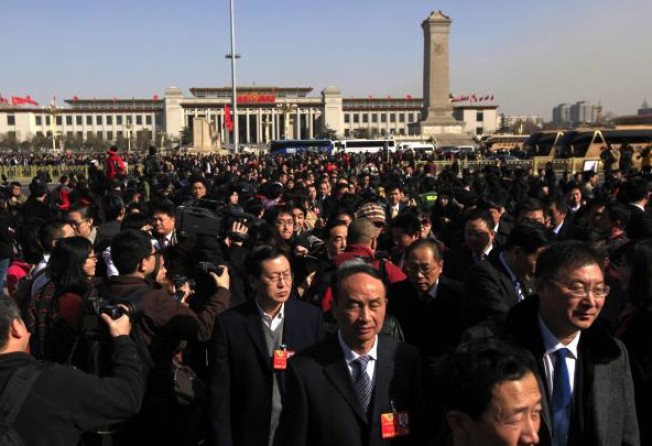CPPCC members split over Hong Kong's milk powder rules

Opinions among members of China's top political consultative body about Hong Kong's new measures to curb exports of milk formula were a mixed bag on Sunday.
They spoke on the sidelines of the opening session of the Chinese People's Political Consultative Conference, only days after the Hong Kong regulation took effect over the weeked. Under the new rules to protect the local supply of infant milk formula, one carrier can take only two tins, or 1.8kg, out of Hong Kong. Offenders face up to two years in prison and a fine of up to HK$500,000.
Wang Xudong, head of the School of Information Technology at Nanjing University of Chinese Medicine, lashed out at Hong Kong’s measures, calling them strict.
“The Hong Kong government is way out of line…[It] only cares about Hong Kong’s babies, not at all for the ones on the mainland. [It thinks] it isn’t enough to only seize milk powder, but even imprison the carriers,” Wang said.
Hui Chi-ming, chairman of the Hong Kong General Association of International Investment, said the limits were only short-term measures.
He said: “Since Hong Kong is a free trading port, the regulations are not in accordance with Hong Kong’s long-term development, nor is it in line with the free market philosophy.”
Other CPPCC members called for a serious crackdown on food safety violators after an seemingly endless stream of scandals in China. They said food safety issues were at the core of the milk power controversy.
Three-time CPPCC member Pan Qinglin from Tianjin urged heavier punishment on offenders. “I suggest imposing the death penalty to [foodmakers who put people in danger]… [Food fabrication] has damaged the image of the Chinese Communist Party,” he said.
Multiple Hong Kong CPPCC members recommended establishing more communication.
Timothy Fok Tsun-ting, former Legislative Council member, said Hong Kong’s curbs on milk powder was not a big deal, but they have sparked tensions that bring to light the need for Hong Kong and Beijing to strengthen communication, he said. Asked about how to instil patriotism in fellow Hongkongers, Fok said: “[We] ought to start from the small, take milk powder as an example, and make a small issue stand out.”

Dr Peter Lam, chairman of Lai Sun Group, demanded that the central government respond to Hong Kong's milk powder shortage.
“People are complaining about the shortage of milk powder. Cross-border traders are such a big burden. Unlike tourism, cross-border trading reveals a negative image on both the mainland and Hong Kong,” he said.
Tengger, a Mongolian rock singer, expressed his understanding towards the public concerns on milk powder. “If the Chinese milk industry can guarantee its quality, of course, people won’t bother buying them from overseas,” he said. “But before that, it is pretty understandable for them to buy from other countries, or Hong Kong.”
CCTV television host Cui Yongyuan expressed similar concerns. “Of course I am not confident about [milk powder safety],” he said, "If people are confident, then they won't go all the way to Hong Kong to buy milk powder."
Some CPPCC members, however, defended the milk powder industry on the mainland.
Milk powder quality on the mainland is suitable for domestic use. Mainlanders choose to purchase cans in Hong Kong mainly because they are cheaper there
“Milk powder quality on the mainland is suitable for domestic use. Mainlanders choose to purchase cans in Hong Kong mainly because they are cheaper there,” said Chen Shiqiang, chairman of Hongchang Group in Henan province.
Lam Ming-sum, life honorary chairman of the Chinese General Chamber of Commerce, expressed a similar opinion. “I think only a minority of milk powder on the mainland has quality issues — 99 out of 100 cans are good. But when the news exposes the one can that is bad, people become scared.”
Cui, though, commenting on the 99 per cent claim, said: “But how would I know where the 1 per cent is?”
Hong Kong’s heavy-handed crackdown on milk formula exports by cross-border traders has seen 45 people arrested as of Monday morning, according to state Xinhua news agency. Twenty-six of those detained were Hong Kong residents and 19 were mainlanders. Authorities seized a total of 178 cans of milk powder each weighing 1.2kg.
Additional reporting by Alan Wong, Stephen Chen, Victoria Ruan, Teddy Ng and Zhuang Pinhui.